If you search for an article on ” how to do SEO for real estate,” the search engine will show you at least 9 to 10 links on the topic in the first search results page.
This is no coincidence. The search engine did not rank these articles randomly. A lot of SEO efforts went into creating each of these pages, and hence Google, or any other search engine like Yahoo or Bing, thinks it’s worth showing these pages in the front of the row.
To do so for a real estate website, you have to have some skills and acquired knowledge of the subject matter. Then, with a little luck, you can get there. Of course, you also need a little run of luck in this matter.
What is Real Estate SEO?
Real estate SEO implies a strategy with the aim to boost the organic traffic on a real estate website by skyrocketing the rankings on the SERPs. The strategies include practices like keyword research, publishing high quality content, website audit, page speed optimization, creating backlink portfolio and many others. Employing these strategies establishes you as a trusted online source, which solidifies your rank on the search rankings.
6 Benefits of Optimizing SEO for Real Estate Websites
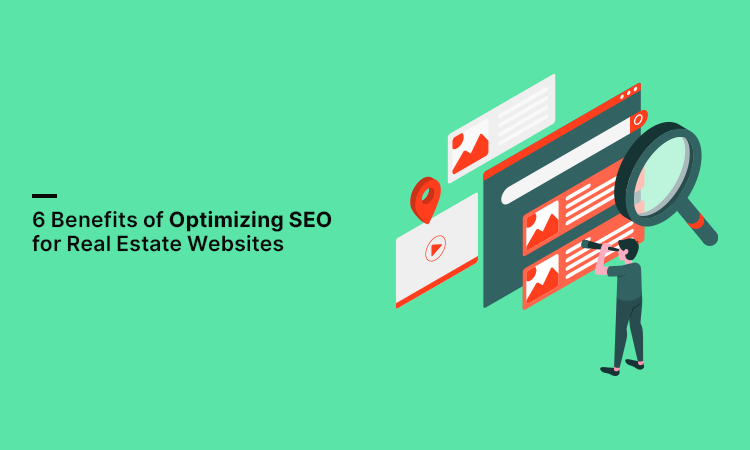
It is no coincidence that the majority of business owners harness the power of SEO to market their business. Let’s put the benefits of SEO for real estate agents into words;
1. Enhanced Visibility Brings More Traffic
The visibility of your website in search engine results can be increased by adhering to the most recent SEO trends. A fully optimized real estate site will have no problem charting up the search engine rankings. With the right SEO strategy and better ranking, your real estate listings will get better online exposure, which translates to more organic traffic.
2. Credibility and Trust Helps in Lead Conversion
Real estate SEO can help you rank higher on the search rankings which is beneficial for client conversions. Statistics suggest that potential clients who are looking online to buy or rent properties are more likely to trust a website that ranks higher.
3. Quality Traffic and Leads for Higher Conversion Rate
SEO helps attract high-quality traffic. It brings genuine home buyers to your site. This targeted traffic increases the likelihood of converting visitors into leads and clients.
4. Cost-Effective Marketing Gives You Higher Profit
Compared to traditional advertising methods, effective SEO is cost-efficient in the long run, providing a consistent stream of organic traffic without continuous ad spend.
5. Adaptable Marketing Measurements Can be Tweaked Anytime
SEO helps your real estate business stay updated with industry trends, algorithms, and emerging technologies. This ensures your real estate business can adapt to changes and remain competitive.
6. Data-Driven Decisions Help for Solid Future Strategy
The process of measuring and analyzing SEO success provides invaluable data for making informed decisions and continuously improving your online marketing strategy.
4 Best Real Estate SEO Strategies to Rank #1 on Search Rankings
SEO for real estate consists of a host of strategies that you need to incorporate with care and caution for best rankings. We are discussing them in detail to help you hardwire SEO best practices for your real estate website.
Without further ado, let’s walk you through the strategis;
1. Perform Impeccable On-Page Real Estate SEO to Mesmerize Visitors
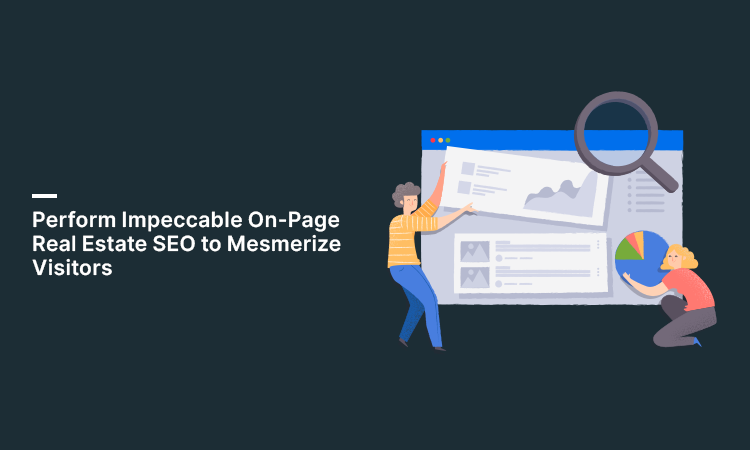
On-page SEO is one of the essential steps for the success of your Real Estate Website. On-page SEO is all about how your website will be viewed by the readers. It encompasses website content, keyword placements, meta tags, Title tags, meta descriptions, head tag optimization, and more.
It is perhaps the simplest part of search engine optimization for real estate.
Let’s explore this aspect of real estate SEO, and then we shall talk about three more important parts that matter in the organic ranking game.
i) Create High Quality Content

One of the primary factors while trying to spark a fire in your real estate SEO is to write helpful content that matches the readers’ search query. As Google prioritizes content quality as the #1 ranking factor, high-quality content has become imperative for the online publicity of your real estate business.
Start with some keyword research. Come up with keywords you can target to rank on the search engines. The trick is to find the keywords that have a high search volume and low competition. Add a few long-tail keywords in the mix, and you are good to go!
However, do not resort to the unethical practice of keyword stuffing. It will not take the search engine giant to sniff the misdeed and flag your website.
You might have to use the best SEO tools to create evergreen content that gives sustainable results.
High-Quality Content Checklist
Take a look at some of the ethical practices that can take your SEO efforts for real estate through the roof;
- Infuse keywords in the content naturally into the content
- Focus on NLP while crafting real estate website content
- Ensure Your content answers the search query fully
- Write content that is unique
ii) Place keywords In Strategic Placements
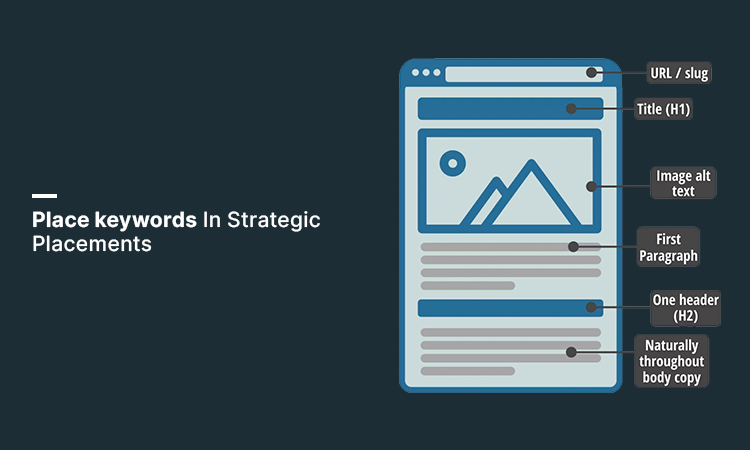
The real estate business is no easy place. The competition is breakneck! Hence, keyword research might not prove enough. Placing them anywhere in your content can be detrimental to your real estate SEO, causing your website to slip on the ladder of organic ranking.
Strategic placements of the target keywords are essential for SEO success. However, the most important thing is to never push a keyword into your sentences. You see, NLP (natural language processing) is as important as keywords in the ranking process. Hence, write the website content naturally while focussing on the optimal usage of keywords.
Keywords Placement Checklist
- Place keywords in H1 or the Title of the Content
- Keywords should be there in the first paragraph of the content
- The h2 should have keywords
- Place keywords in the first paragraph following each h2
iii) Make Keyword-Rich Title Tags & Meta Description
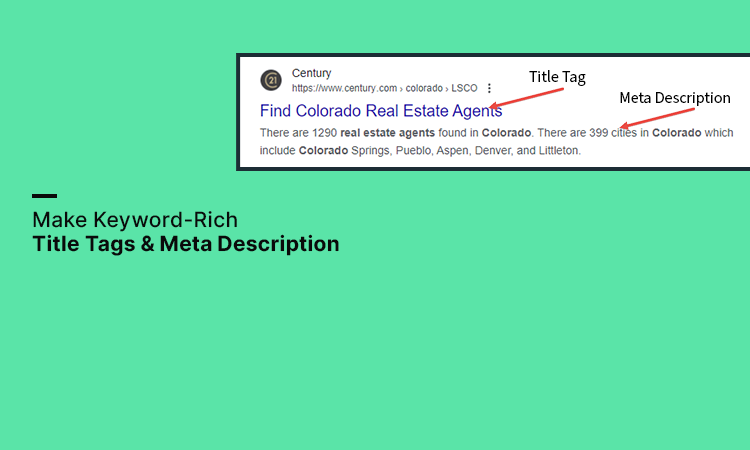
In the earlier point, we advised to make the headings keyword-dense. However, it is not only about the main keywords. The ideal length of any title/heading for any website is between 50 to 60 characters.
Adhere to this length of the main title so that it can fit into a desktop or mobile screen entirely. Use the main keyword once in the main heading and the meta description. You can punctuate the meta description with one or two secondary keywords for better rankings.
In this case, let’s take an example. For instance, you want to rank the keyword “best real estate agent in Colorado”. Apart from the main keyword, you can use phrases like “Real estate brokers in Colorado”. These synonymous phrases help search engines understand the context of the content.
Checklist for Keyword Usage in the Headings & Meta Description
- Put the target keyword in the front of the title tag
- The title should not be longer than 50 to 60 characters (including spaces)
- Use the main keyword in the meta description
- Use a few secondary keywords in the meta description
iv) Use H Tags for Marking Content Structure
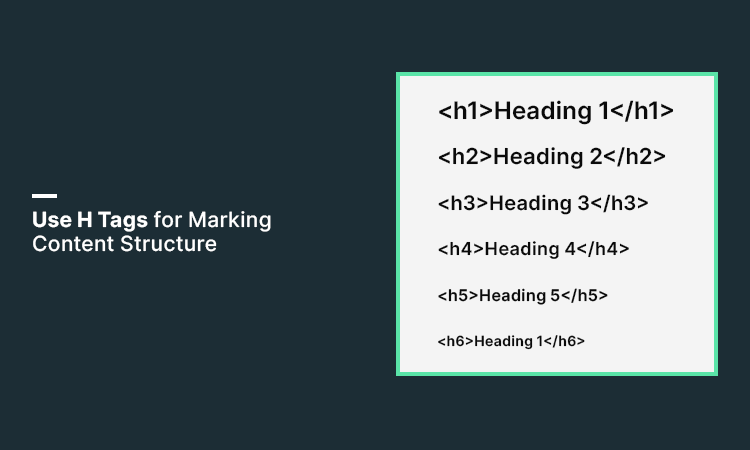
H tags are semantic HTML elements that you can use to enhance the on-page SEO on your real estate website. It helps you structure the website by dividing the content into parts that are easily readable by search engines.
H tags are crucial for the structuring of your articles. Website content without H tags is a big wall of text to search engines, as web crawlers cannot decipher the headings on their own.
For the best search engine rankings of your real estate website, there are a few things about H tags you should know. Let’s take a look at them;
Checklist to Use H Tags in Your Content
- Use main keywords a few times in the H tags
- The word limit between H tags should not exceed 300 words
- The H tag format should be symmetrical, i.e., H1, H2, H3, and so on
v) Optimize the URLs for Better Rankings
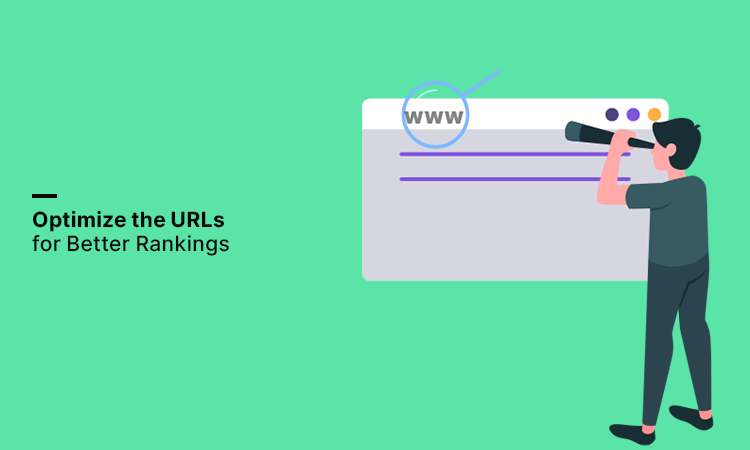
URLs or web addresses are critical on-page factors to consider, especially in a competitive industry like real estate where there is breakneck competition.
The URL should be simple. It is preferable NOT to include non-ASCII characters in the URL. Encoding these characters is a bit complex, and when not done right, it can result in broken links that can affect the overall user experience.
As a real estate investor wanting traction in the SERPs, it is best to follow Google’s guidelines for URL creation if you want to create a rocking on-page SEO. It simply asks you to use descriptive words in the URL, use UTF-8 coding when necessary, and use a country-specific subdirectory. Incorporating dialect keywords is a good idea if and when necessary.
Checklist for Creating the Best URLs for Real Estate Websites
- Use descriptive word
- Keep the URL simple and easy to understand by the search engines
- Create a secure protocol
- Use the local word in the URL if applicable
- Avoid the usage of underscores ‘_’; use hyphen instead
vi) Internal & External Links Distribute Authority
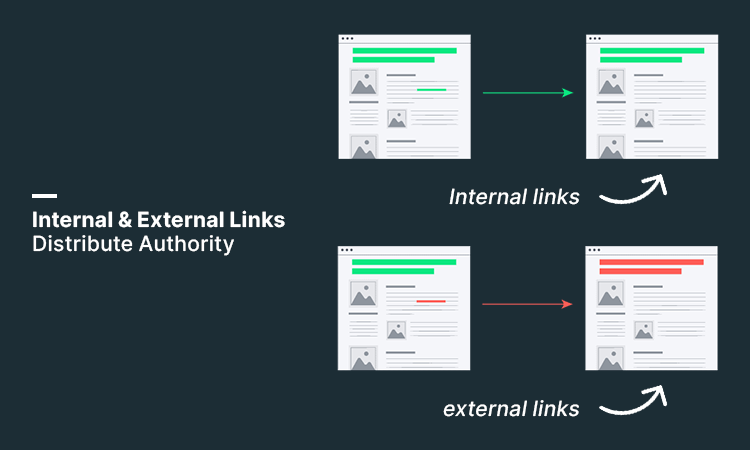
Internal and external linking has become one of the core practices of search engine optimization. The real estate sector is no exception. In fact, real estate agents’ websites require this strategy even more.
Internal linking indicates linking a webpage of your own website to another. Internal links pass authority to other pages on your own website. It helps web crawlers screen more than one article in one go. It can result in a cumulative boost of multiple web pages at the same time.
External linking, on the other hand, denotes placing a link on your web page that connects to other websites. It provides value to the readers. External links also facilitate the earning of the trust of search engines.
There is no fixed number of internal and external links that you can place on Google. However, you must be mindful to keep the links relevant to the topic of the web page. If not, the results can be detrimental.
Checklist for Internal & External Linking
- Do not use keyword-stuffing anchor texts
- Add links to relevant keywords
- Always ensure relevancy
2. Earn the Trust of Search Engines with Off-Page SEO

Off-page SEO is a vital component of real estate SEO strategy. For an investor or a real estate agent, maintaining a top-notch off-site SEO should be one of the key priorities. 91% of customers say that they are influenced by online reviews.
There is an array of other considerations in the off-page SEO front for real estate, such as social media marketing, guest posting, backlink acquiring, etc. Let’s delineate these strategies further;
i) Quality Backlinks Fosters Trustability Quotient
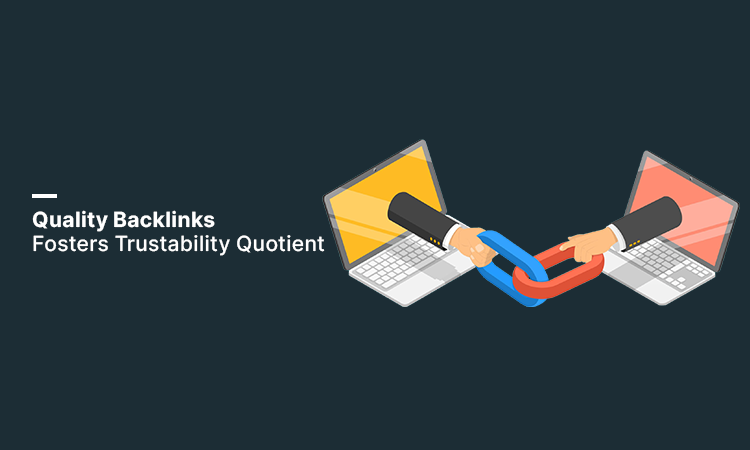
Let’s start by saying that link building is not a one-time game. It takes time. Let links build naturally. This happens when other websites of the same niche discover your website, find something valuable, and want to link back.
In the arena of link building, haste makes waste! Acquiring too many links too quickly can come across as fishy to the search engines.
If you are struggling with natural link building, then you can rely on link building services to get the job done. You can engage in outreach strategies and connect with other professionals in the real estate field for potential link-building collaborations.
Quality backlinks are one of the key signifiers of the trustability quotient in the eyes of the search engine. It signals the search engines that your website is authentic, caters value to the readers, and is meritable.
Checklist for High Quality Backlinks:
- Build link naturally
- Acquire links to websites that are of real estate niche
- Engage in guest blogging for better results
ii) Establish a Solid Social Media Presence

About 2/3 of the global population is on social media. According to Statista, 62.3% of people use social media. Hence, as a realtor, passing on this strategy can mean a loss for your business.
Suppose you are handling social media marketing for real estate on your own. In that case, you can start with opening profiles on mainstream social platforms like Facebook, X (formerly Twitter), Instagram, and YouTube.
There are various popular real estate groups on these platforms. Use these groups to post your listings, earn references, and converse to know more from your fellow mates.
Handling social media means posting on a regular basis. This does not mean that you have to post every single day. However, try posting a couple of times a week to remain active.
Ensure you have kept the NAP SEO consistent on Google, your own website, on the GBP, and all the social media handles.
Social Media Marketing for Real Estate Checklist:
- Create social media accounts on all mainstream social channels
- Update profile with accurate business information
- Post regularly or semi-regularly on social media platforms
- Leverage user generated content to your advantage
- Join active real estate groups on social media
iii) Online Reviews Garners Trust of the Visitors

Online reviews are one of the most potent off-page SEO factors that signal business quality to customers. Positive online reviews are influential in building trust and credibility, while negative reviews are the opposite.
Hence, servicing your clients to the best of your capacity might fall short in the SEO game if you fail to secure a good review. Statistics say that 79% of people are highly likely to leave an online review if you ask them.
Actively request reviews from satisfied clients, guiding them to leave feedback on platforms like Google, Yelp, and Zillow. Respond promptly to both positive and negative reviews, demonstrating your commitment to client satisfaction.
Let us debunk a myth: clients don’t always trust 5-star reviews. In fact, 68% of customers won’t trust an online review until it is followed by others. A collection of positive reviews not only boosts your online reputation but also acts as a compelling endorsement for potential clients.
Last but not least, flaunt the positive reviews. Put these reviews front and center so that visitors and web surfers can easily view them.
Checklist for Acquiring Positive Online Reviews:
- Offer them the best services
- Be on the platforms the buyers are on
- Close real estate deals politely and ask follow-up questions
- Ask them to leave an honest review at the end of the transaction
iv) Video Marketing: A Great Way to earn Organic Traffic

In the 21st century, videos are more impactful than plain texts. Most people are visual learners, and hence, it is no surprise that a video receives 94% more views than plain text content does. Hence, as a real estate agent, video marketing should be one of the best resorts for gaining mileage with potential buyers’ attention.
Especially in the real estate business, video marketing is a superb tool for showcasing properties inside out. We suggest you hire a professional to shoot the video rather than doing it on your phone. A professional would ensure that they capture the best angles and features of the property that will lure potential clients to call.
Once you have the video, you can upload it on YouTube. You can also shorten the videos and upload a few glimpses of the listing on your own website to attract more organic traffic.
Checklist on Video Marketing for Realtors
- determine your target audience and create video content to suit their taste
- Include a clear message with the video that propels people to take action
- Hire a professional to shoot the video. Ensure you have clear lighting, as it matters a lot
- Upload videos on social media and your website
- Optimize the video and track performance
v) Use the Age-Old Technique of Guest Blogging
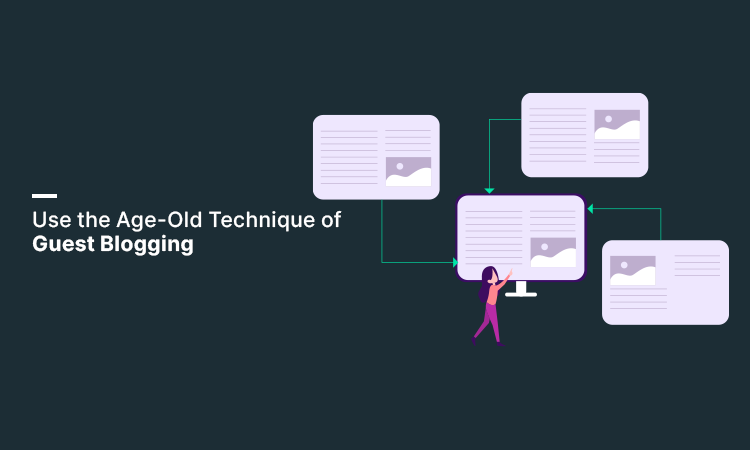
Guest blogging is a powerful strategy for acquiring backlinks. This strategy helps you get features in reputed websites of the same niche, builds a backlink portfolio, and attracts web crawlers to rank your website higher on the search engine results pages.
Collaborating with other professionals in the real estate niche through guest blogging can expand your reach and build backlinks. For guest blogging, identify credible websites in the real estate niche. Segregate the websites that you want to be featured on and contact the webmaster with an offer.
Create high-quality content on real estate topics that people who are interested in buying properties are searching for. It is best to do some basic keyword research beforehand and sprinkle a few keywords and phrases here and there for good traction on the search engines. If you think that guest posting is a tad burdensome, you can always seek some assistance from a good guest blogging service provider.
Guest blogging is a two-edged sword that real estate agents can use. On one side, you earn referral traffic with guest posting; on the other, it boosts your domain’s credibility.
Pro Tip: Include a link back to your website in your author bio to drive traffic and enhance your link profile.
Checklist for Guest Blogging for Realtors
- Research keywords for anchor text that links back to your web page
- Approach the webmaster with the proposal
- Write high-quality guest posts that cater value to the readers
- Manually supervise guest post publishing
- Monitor and track the performance
3. Create Seamless UX with Technical SEO for Real Estate

This is the aspect that gets tough for an SEO novice to tread. Technical SEO for real estate can seem vast as there are so many aspects to take care of. You can learn the ropes with some effort, although it will take a while.
If you are determined to handle real estate SEO in a wholesome way, here we are to help. Let’s break down technical SEO for real estate part by part;
i) Take Time to Do Keyword Research on Real Estate Businesses

Although the foundation of seamless on-page SEO is rooted in good keyword research, the action itself falls under technical SEO.
Finding keywords with high search volume and low competition can be challenging for a competitive market like real estate. As someone starting off new, I think Google Keyword Planner should be your go-to option. You can try some keyword-suggestion tools or use premium ones like Semrush and Moz to get your hands on keywords that will bleed gold for your business.
Identify keywords and search phrases that people are that are relevant to people, such as ” best properties near me”, ”best real estate agents”, etc. While toying with the main keyword or any particular content, come up with some LSI keywords. These synonymous words add to the variety of vocabulary usage in the content.
If you want to be particular, you can target longtail keywords to address the specific search intent of potential clients.
Checklist for Keyword Research for Real Estate Websites
- Use keyword research tools (free or paid)
- Always look at the keyword difficulty before targeting it in your website content
- Find relevant keywords that your target audience a
- Create a keyword set that consists of high search volume low volume keywords
- Target longtail keywords to address specific search queries
ii) Mobile Optimization is Primary for a Good SERP Ranking
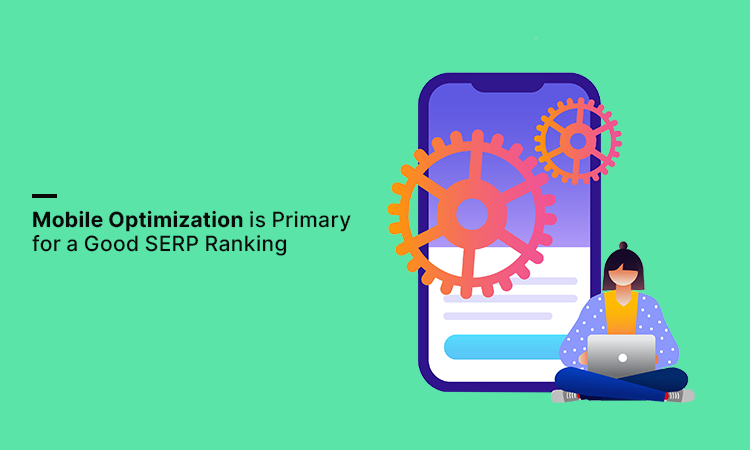
The Google algorithm is set in a way that indexes a website’s mobile version first. Because of the mobile-first indexing, mobile optimization is imperative.
Most people like to browse the internet while on the go. As of March 2024, 92.3% of people browse the internet from mobile or tablets. Hence, mobile optimization is one of the most potent ways to ensure your website ranks high not only on Google but also on other search engines.
Mobile optimization should be one of the first SEO tactics you should apply on your website as most people who search for properties on rent or for possession tend to use mobile devices for the search. After mobile optimization, you can use mobile optimization testing tools to check for yourself afterward.
Checklist for Mobile Optimization
- Use a mobile-first approach
- Choose a responsive design
- Optimize Images for mobile screen dimensions
- Settle for mobile friendly fonts
- Keep pop-ups to a minimum
iii) Page Speed Optimization Keeps the Visitors Hooked

The millennials and Gen Z want to view results as soon as they click on a link. With each passing second, the chances of bounce increases. Try to keep the page loading time of your real estate website under 2 seconds. However, that is the maximum. The optimum page loading time is under 1 second.
Real estate websites are often crammed with hordes of images/videos from all the listings. These images take up a lot of space and slow down the website. The best bet to skyrocket the page speed is to compress the images. Also, minimize the CSS and JavaScript files.
It is best to keep a tab on it from time to time. To have a better grasp of the current speed of your website, use page speed testing tools to pass the core web vitals. A faster website will not only give you an edge in the search engine rankings but also better user behavior.
Checklist for Page Speed Optimization
- Check the core web vitals
- Minimize CSS and Java files
- Compress image size
iv) Structured Data Markup Makes Content More palatable for Search Engines
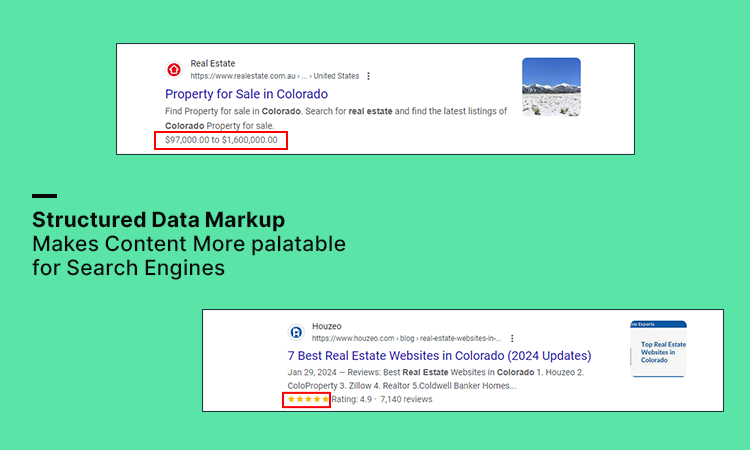
This is a very important part of optimizing technical SEO for real estate websites. Structured data markup implies marking a group of text and tagging them to make it legible for search engines. It uses a predefined format in which the data are entered, hence the name.
Structured data provides search engines with additional information regarding your property listings, such as price, available date, property location, etc. It enhances the visibility of the real estate listings on the SERPs by featuring them in rich snippets.
To do structured data markup, you might need the help of an expert or at least a few lessons to learn. Doing wrong markups can mess up your website. You can start by reading Google’s guidelines on structured data markup. This should give you a comprehensive idea of the subject matter.
Checklist for Structured Data Markup
- Choose the right type of schema markup
- Identify which areas you want to markup
- Include valid URLs in the schema markup
- Use Google’s rich snippets and rich cards
- Test your structured data with Google’s Schema markup testing tool
v) Optimize Images for Ranking TWICE on the SERPs
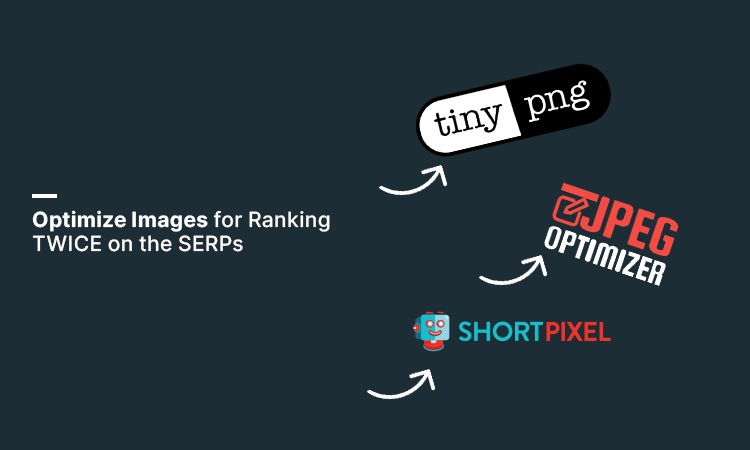
A real estate website without property images is sure to tank. Images play a crucial role in attracting potential clients to contact you. However, uploading these images alone won’t cut it. You have to do enough to rank on the first page of the search results.
How?
Let us tell you the first thing. It is to never upload heavy images. Compress them using image-compressing tools like TinyPNG, JPEG Optimizer, and ShortPixel. These tools compress images without compromising on the content quality.
Alt tags should also be used to optimize the images. Using these tags ensures that the search engines can feature these images in the image search when someone uses related keywords to search.
Checklist for Image Optimization
- Use compressed images
- Ensure that the image quality is not compromised during the compression process
- Use image alt tags
vi) SSL Certificate is an Absolute Must!

Google prioritizes user safety and security. Any website that resorts to spam, phishing, or compromises the data security of users would not be seen in light by Google. Hence, securing an SSL certificate that ensures website security can be good for search engine rankings.
Obtaining an SSL certificate for a real estate website boosts your credibility as search engines prioritize secured websites. It poses you as an authority in your domain. However, you first have to know the type of SSL certificate you need.
Now, there are a few steps to obtaining an SSL certificate. Take a look at our checklist for better ranking for your real estate website.
Checklist for Obtaining an SSL Certificate:
- Check your WHOIS record
- Verify your website’s information through ICANN Lookup
- Choose a certificate authority
- Generate a certificate signing request
- Submit the certificate signing request
- Install the certificate on your website
vii) Regular Content Updates Keep your Website Relevant

Your website would rank only if the search engines find it relevant. For that to happen, you have to keep up with the pace. Always update your content. If there is any new information available, incorporate that into your content so that it imparts value to the readers.
Updating real estate content includes updating website blogs, service pages, listicles, etc. Also, keeps uploading new content every once in a while, so that the website stays relevant. Regular updates show search engines that your site is active and authoritative.
Content Update Checklist
- Check for old or outdated content
- Add the latest information to the content
- Keep updating website content every 6 to 12 months
4. Why Local SEO Matters the Most for Real Estate Agents?

While on-page, off-page, and technical SEO are super-important, local SEO offers unique benefits for businesses targeting a specific geographic area. Let’s briefly discuss the local SEO strategies that help websites gain more organic traffic in the local search results.
i) Claim Your Google My Business Profile
Google’s algorithm for ‘NEAR ME searches’ is at its best in recent years. However, Google cannot do a single bit if you choose to remain silent about optimizing your website’s local search results.
Local SEO is pivotal for realtors. It is imperative if you wish to establish a strong online presence within your specific geographic area. To optimize the local SEO, you need to start by claiming your Google Business Profile (previously Google My Business).
A Google Business Profile is the single most crucial local ranking factor. It lets you make a super strong impression by making your real estate business visible not only on the Google search results but also on the Google Map rankings.
So, by leveraging Google business profile & google map SEO), you can rank twice on the first page. First in the search results and second in the map rankings.
ii) Be Consistent with NAP (Name, Address, Phone Number)
People cannot contact you if they do not know your name, address, phone number or the location of your office. This is where NAP SEO comes in. As a real estate agent, you must ensure that your real estate business name, address, and phone number are consistent on every platform (website, social media, local directories, GBP, etc.).
iii) Use Local Keywords
Local people get lured in when local taste is catered to. You have to understand that dialect barriers can play a major role. To soar higher in the local search, incorporate local keywords in your content. Your website content will not only speak to them but also interest them in viewing your listings. You can also use local keywords in the web page URL for better results.
You can start by using region-specific keywords that potential clients may use when searching for legal services in your area. This can include mentioning nearby landmarks, neighbourhoods, or city-specific terms.
iv) Use Geo-Targeting
Geo-targeting is one of the best ways to target a cohort of people who might be interested in renting or buying a property. For this, first, you have to scour the market, understand what people are looking for in a property, and then use the geo-targeting feature in the Google Search Console. With the help of this feature, you can target a particular area, gender, or age group.
The benefit of geo-targeting is that organic traffic that comes to your website is primarily interested in what you are listing. It increases the on-page time, which is a good signal for the search engines for better rankings on the SERPs.
Top 5 Reasons Why Should Real Estate Agents Hire SEO Services?

Search engine optimization is no cakewalk! You need knowledge, resources, and TIME to optimize a real estate website so that it ranks on the first page.
For the non-SEO experts out there, this can mean a lot of effort that many might not want to make because of the time crunch. Also, SEO for property-related websites is tougher to rank because of the market competition.
This is why entrusting an expert SEO company with this task might be the wiser choice.
1. Increased Online Visibility
Professsional SEO services can optimize your real estate agent’s website in a shorter time. Even if you start with a relatively new domain, having an SEO agency by your side will garner faster results than those trying to optimize SEO on their own.
These agencies hire SEO experts who understand the real estate business and what strategies would work for your website. They gather insights by running a website audit and then formulate the SEO strategy that aligns with your company to boost online visibility on the search engine results pages.
2. Targeted Traffic
By optimizing for relevant keywords, SEO helps attract individuals actively interested in buying, selling, or renting properties, ensuring that the website attracts a more targeted and qualified audience.
Reaching out to random people is like shooting in the dark! A real estate SEO company understands the necessity of targeting appropriate customers to avoid instances of funnel drop-offs and irrelevant traffic.
3. Competitive Edge
According to data, about 56% of businesses don’t invest in SEO. And studies also suggest that these businesses lag because of a lack of online visibility.
Investing in SEO services will automatically equip you with a competitive edge by rendering better visibility to your website on various online platforms.
4. Local Presence
These service agencies have in-house experts who augment your local Presence on the digital front. You can choose individual services or settle for the whole local SEO package if you wish. There are some companies who are flexible enough to tailor their local SEO packages to suit your needs.
5. Credibility and Trust
SEO can be done free of cost. But the downside is there are a thousand ways to go wrong. And each mistake can either mean a fall in rankings or a penalty!
SEO experts know the ropes. With their ethical SEO practices, your website will earn credibility and trust from both visitors and search engines.
FAQs
Search engines take time to read articles. On average, SEO efforts for real estate would take anywhere between 1 to 6 months to show results. The exact time depends on factors like domain authority, expertise, and the adopted strategies.
You can optimize property listings for search engines by including relevant keywords in the descriptions and using meta tags and alt tags in the images. Also, provide accurate property details on the website. Also, ensure that the website’s core web vitals are good for the best optimization.
Some of the most common SEO mistakes people make are keyword stuffing, neglecting core web vitals, not doing mobile optimization, and not paying heed to UX.
Real estate businesses can measure their efforts by tracking the key performance indicators. Also, track the volume of organic traffic on your website, keyword rankings, bounce rates, and user behavior. Conversion rate is another potent indicator of the success of SEO efforts.
Final Words
Forming a comprehensive real estate SEO strategy is time-consuming. However, if you can manage to do it on your own, you can tweak the strategy at your will without anyone’s assistance. Needless to say, the DIY SEO method will also save some money. However, if you think you need a helping hand, you can search for the best SEO agencies and choose one to get the job done.
We hope that this blog was helpful in guiding you around how to do real estate SEO. If you know any other SEO strategies for real estate, comment below to let us know.
Additional Resource:


